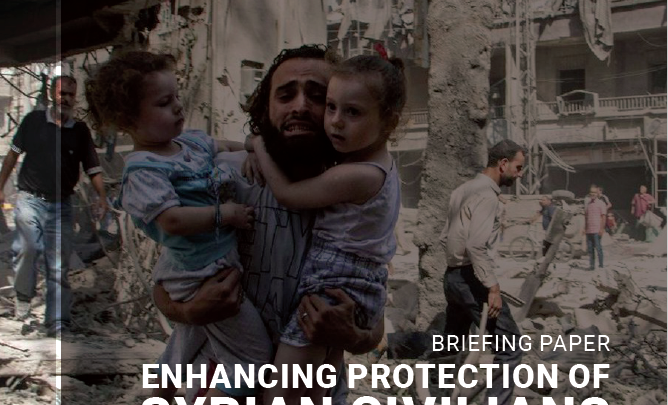Foreign PolicyPolicy In Focus
ICRD Briefing: Enhancing Protection of Syrian Civilians

The International Centre for Relations & Diplomacy (ICRD) has published a briefing entitled Enhancing Protection of Syrian Civilians.
This paper outlines the need for better protection efforts for civilians who are living among hostilities in Syria, where the conflict has been characterised by untold violence and also human rights abuses. While aid is forthcoming from the international community, sustained humanitarian access is wanting and has also been politicised. Efforts need to be made to de-politicise and increase access to humanitarian aid and to produce more safe and legal pathways for Syrians to escape the violence.
The Syrian conflict has caused reprehensible damage, displacement and death since it commenced in 2011 with over 400,000 casualties, 6.15 million internally displaced persons and 13.5 million people in need of humanitarian assistance.
Those who flee go to neighbouring countries or attempt a hazardous journey to Europe. Deaths over the last few years are in the thousands and camp settings remain risky and can compound existing trauma felt by those living in them.
The conflict appears relentless and has caused fear of various human rights violations. Thus protection mechanisms for civilians in Syria must remain at the forefront of states’ foreign policy. As well as humanitarian assistance, asylum is one of the best humanitarian solutions to provide protection to people trapped in war zones. However, in light of the dangers of fleeing, there needs to be safe and legal pathways to protect Syrian refugees.
Where the UK is concerned, the government has said it will accept 20,000 Syrian refugees by 2020 through a voluntary resettlement programme. In addition, it is possible for Syrians to claim asylum upon arrival or after entry to the UK. Syrian nationals may also, for a temporary amount of time, apply for an extension to their existing visa or change the category of their visa.
There’s more the government can do however, without a large overhaul to its current policy. For instance many local authorities have indicated they can accommodate more refugees through the voluntary resettlement scheme. If local authorities have expressed they can shoulder the responsibility for additional refugees, this is simply low hanging fruit to help increase protection efforts for Syrian civilians.
The UK government can also implement a humanitarian visa system so that Syrian nationals can apply for asylum from another country instead of having to make unnecessary dangerous and harrowing journeys.
It can extend the definition of ‘family’ for the purposes of family reunification. Not all family units are made up of the nuclear family. Many people’s support networks are heavily dependent on uncles, aunts and grandparents for instance. Understanding this notion and broadening the definition will enable more Syrians to reach a place of safety without large repurposing of policy.
The government can support a number of other safe and legal pathways for Syrians to enter the UK including medical evacuation, labour mobility schemes and academic scholarships. These would bypass the strife and hardship Syrians initially endure to get to the country.
Finally, while the UK prefers to provide humanitarian aid above resettling refugees, there are various improvements currently needed with regards to the delivery of aid to enable sustained humanitarian access and to avoid it being used as a political weapon.
ICRD proposes the following recommendations:
- The UK should allow all pledges of sponsorship for refugee resettlement to be fulfilled.
- Increase the impact of family reunification rules by passing the Refugees (Family Reunion) (No. 2) Bill 2017-19.
- Provide other safe and legal pathways for Syrians to seek refuge in the UK including humanitarian visas, academic scholarships and labour mobility programmes.
- Pledge to admit Syrians with serious medical conditions for treatment.
- Trigger an approach to deter aid from being used as a political tool within Syria.





